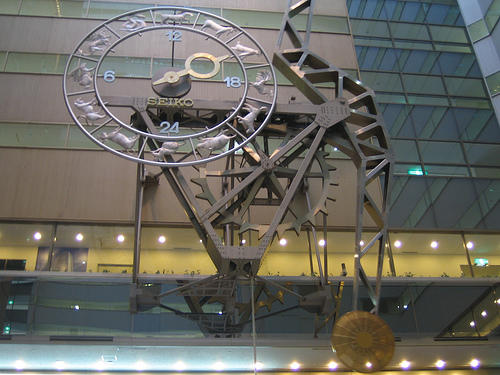Lesson 8 - Vocabulary:
Time
(photo
by Colin McMillen used
under terms of Creative Commons license.)

The system of writing Japanese used in this course is called the Hepburn system. Pronunciation of most of the letters presents no difficulty to an American. Those letters or combinations of letters considered difficult to pronounce will be explained in this section of the modules.
In this lesson you may have difficulty with the following:
1. The letter g in the middle of a word is pronounced like the ng in "sing" by natives of Tokyo. Listen:
|
sugu |
sugu |
2. The letters marked with a bar, ō and ū, are pronounced longer than ones without a bar. Listen:
|
mō |
kyō |
jū |
kyū |
3. When double letters appear in a Japanese word, as in ip-pun, the sound is repeated. Think of double letters as having a hyphen between them and pronounce both letters distinctly. Listen:
|
ip-pun
|
rop-pun
|
hap-pun
|
jup-pun |
4. When i and u are written with a slash mark through them, they are slurred, or barely pronounced. Listen:
|
ash |
sh |
ts |
demas |
5. When the letter n is the last letter in a word, it may sound somewhat like the ng in "sing." Listen:
|
han |
ip-pun |
|
ichi-ji
|
one o'clock |
|
ni-ji |
two o'clock |
|
san-ji
|
three o'clock |
|
yo-ji |
four o'clock |
|
go-ji |
five o'clock |
|
rok |
six o'clock |
|
sh |
seven o'clock |
|
hachi-ji
|
eight o'clock |
|
ku-ji |
nine o'clock |
|
jū-ji |
ten o'clock |
|
jū-ichi-ji
|
eleven o'clock |
|
jū-ni-ji |
twelve o'clock |
|
ip-pun |
one minute;
__:01 |
|
ni-fun |
two minutes;
__:02 |
|
sam-pun |
three minutes; __:03 |
|
yom-pun |
four minutes;
__:04 |
|
go-fun |
five minutes;
__:05 |
|
rop-pun |
six minutes;
__:06 |
|
nana-fun |
seven minutes; __:07 |
|
hap-pun |
eight minutes;
__:08 |
|
kyū-fun |
nine minutes;
__:09 |
|
jup-pun |
ten minutes;
__: 10 |
|
jū-ip-pun |
eleven minutes;
__: 11 |
|
jū-ni-fun |
twelve minutes;
__: 12 |
|
jū-sam-pun |
thirteen minutes; __: 13 |
|
jū-yom-pun |
fourteen minutes;
__: 14 |
|
jū-go-fun
|
fifteen minutes;
__: 15 |
|
jū-rop-pun
|
sixteen minutes;
__: 16 |
|
jū-nana-fun |
seventeen minutes; __: 17 |
|
jū-hap-pun |
eighteen minutes;
__: 18 |
|
jū-kyū-fun |
nineteen minutes;
__:19 |
|
ni-jup-pun |
twenty minutes;
__:20 |
|
san-jup-pun |
thirty minutes;
__:30 |
|
yon-jup-pun |
forty minutes;
__:40 |
|
go-jup-pun |
fifty minutes;
__:50 |
|
des |
is; will
be |
|
des |
is it? |
|
nan-j i
des |
what time
is it?
|
|
ima |
now |
|
ima
nan-ji des |
what time
is it now? |
|
mae |
before
|
|
sugi |
after |
|
han |
half-past |
|
kyō |
today |
|
ash |
tomorrow
|
|
demas |
leave; we
leave; it leaves |
|
demas |
do we
leave?/does it leave? |
|
ni |
at; in |
|
nan-ji
ni? |
at what
time? |
|
nan-ji
ni demas |
at what
time do we
leave? |
|
ts |
get there;
arrive; we get there;
it arrives |
|
ts |
do we
get there?
/ does it arrive? |
|
nan-ji
ni ts |
at what
time do we
get there?
|
|
|
at |
|
Tōkyō
ni nan-ji ni
ts |
at what
time does it
arrive at |
|
de |
in |
|
go-fun
de |
in five
minutes |
|
mō |
more; another |
|
mō
go-fun de
|
in five
more minutes; in
another five minutes |
|
gurai |
about |
|
mō
go-fun gurai de |
in about
another five minutes |
|
goro |
about; around |
|
ni-ji
goro des |
it's about
two o'clock
|
|
ni-ji
goro ni demas |
we leave
at around two
o'clock |
|
san-ji
goro ni ts |
we arrive
at around three
o'clock. |
|
kore |
this; this
one |
|
kore
nan-ji ni demas |
at what
time does this
leave? |